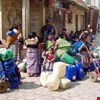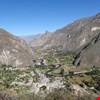

Among the knowledge products the Water, Climate and Development programme of GWP Central America worked on in 2014, are the analysis for the promotion of water security through no/low regrets investments in climate change plans and strategies at the country level.

GWP Central America organized a workshop for 25 municipal leaders and technical personnel of civil society that work on water issues. The event, which focused on risk management, took place in Tegucigalpa, Honduras, on February 23-27.

GWP Central America has been working closely with the Regional Committee for Water Resources (CRRH), which is part of the Central American Integration System, to strengthen regional capacity in the monitoring of climate to support decision making, especially related to agriculture, fisheries, water resources management, risk management and food security.

GWP Central America, with the support of the Legislative Assembly of El Salvador, organised the VIII Legislators Conference on Water Resources, which took place on October 28, 2014, in San Salvador.

On March 31st 2014, the Costa Rican Congress passed the new Water Law. For over a decade the Central American countries have been working on reforming their water legislative and institutional frameworks, and one of the pioneers in this process has been Costa Rica.

GWP South America recently organised the first Latin American workshop on International Waters Law. The initiative is a collaboration with GWP Central America and aims to encourage improved international cooperation on water governance.

Food security is considered one of the greatest challenges currently facing humanity. Water is a crucial natural resource in food production, and for this reason food and water experts met in Costa Rica. The aim was to establish a dialogue between the two sectors.
GWP Honduras has published two new documents to contribute to the national discussion on water security and local water management.

GWP South America is working on the implementation of a new Latin American Training Programme on Water Legislation for International River Basins. This programme aims to encourage improved international cooperation and facilitate good water governance in the region. Its main outputs will be three training workshops, a manual to support training processes and a monitoring report which will identify knowledge gaps, capacity needs, lessons learned and follow-up needs.

Many climate change models predict that increasing temperatures, droughts, heavy precipitation and other extreme climatic events will have severe impacts on family farmers. Yields might be reduced by up to 50 percent in dry regions at the same time as family farming continues to be the basis unit of the agricultural economy in developing countries.